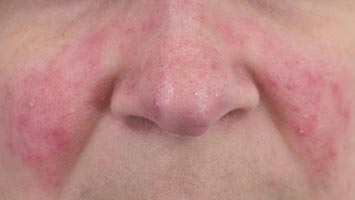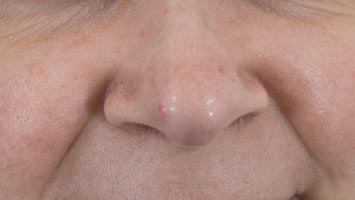Rosacea
Rosacea, or Jiu Zha (drinkers nose), as it is called in Chinese, is an inflammatory disorder of the blood vessels in the face. Recent studies have suggested that rosacea may be a malfunction of the immune system resulting in signs and symptoms such as inflammation, bumps and pimples. Rosacea can be triggered by ultraviolet sunlight and/or bacteria in the skin. There is a genetic tendency of this disease, with a much higher incidence seen in those of Celtic background. However, anyone of any ethnicity can be affected.
Symptoms
Rosacea usually starts off as flushing and blushing when you are young with the cheeks becoming more permanently red when you reach your thirties and forties. Over time this redness takes on a deeper purplish-red colour, and little distended veins called telangiectasia, or spider veins, become visible on the cheeks and nose. Acne type lesions, papules and pustules, may also complicate the matter; although this is not true acne as there are no commedones (white and black heads) present. Rhinophyma is also common, especially in men, whereby the skin cells of the nose become enlarged–resulting in the typical HG Wells look.
Treatment
Chinese medical texts have documented the treatment of rosacea for at least 2000 years. Based on Traditional Chinese formulas and modern research, I individually formulate a Chinese herbal tea for each patient designed to improving the local blood circulation in the face and reduce the inflammatory response. In some cases I also prescribe an individually compounded topical cream.
Success
People with rosacea respond quite well to treatment with herbal medicines, with most seeing at least 90% or more of their skin clearing. Results are generally seen in the first few weeks, with reduced redness, flushing, swelling of tissue and disappearance of pimples. A typical course of treatment averages around 5 months, with many patients finding their skin remaining stable long after they stop their herbal medicines.
While the treatment aims to reduce inflammation and to prevent the formation of telangiectasis (spider veins) or rhinophyma, herbal medicine may not clear what has already formed. Both vascular laser and intense pulsed light treatment may help remove telengectasia. Rhinophyma often needs surgical reshaping by a plastic surgeon.

before

after
